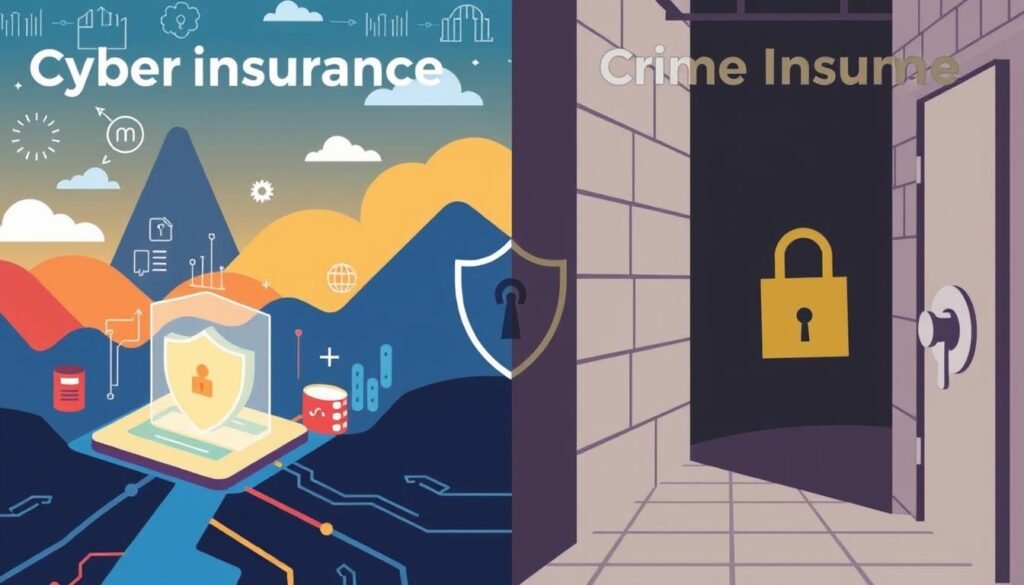In today’s world, cyber threats are a big problem. Data breaches in the US cost companies an average of $4 million1. This makes cyber and crime insurance very important for businesses. These policies help protect your business from financial loss and keep your reputation and customer trust safe.
Cyber insurance helps with financial and reputational damages, including recovery services2. Crime insurance protects against financial losses from criminal activities by employees or third parties2. Both are key in reducing the harm from cyber attacks and criminal incidents. They help your business recover and come back stronger.
Key Takeaways
- Cyber insurance covers data breaches, cyber extortion, and business interruption, while crime insurance protects against employee misconduct, fraud, and forgery.
- Cyber insurance focuses on digital threats, while crime insurance covers physical and financial threats like theft and fraud.
- Cyber insurance may include liability coverage for legal expenses and damages from cyber incidents leading to lawsuits.
- Some businesses hesitate to get insurance due to low perceived risks, overconfidence in security, budget constraints, and self-insurance strategies.
- Phishing emails initiate 91% of all cyber attacks, and one out of every 2,000 emails sent daily is a phishing scam.
Understanding Cyber Insurance
In today’s digital world, cyber insurance is key for businesses of all sizes. It protects them from the financial and reputational hits of cyberattacks and data breaches3. This coverage can help with legal costs, data breach expenses, and more3.
What is Cyber Insurance?
Cyber insurance is a policy that fights cybercrime risks like hacking and data theft3. Companies store sensitive info, leading to big risks3. It ensures businesses can handle cyber incidents well.
Why Businesses Need Cyber Insurance
Cyberattacks are a big risk for businesses, and the costs of a data breach are huge3. Cyber insurance covers these costs, helping businesses stay afloat after an attack3. It also offers global coverage, meeting international notification needs3.
Getting cyber insurance is smart for any business. It shields against financial and reputational damage, preparing businesses for cyber threats4. Cyber insurance is vital for a strong cybersecurity plan4.
“Cyber insurance can help government institutions safeguard against cyber attacks, ensuring the continuity of public services.”4
| Key Features of Cyber Insurance | Benefits |
|---|---|
| Liability coverage for data breaches | Protects against legal and regulatory costs |
| Incident response and crisis management | Helps mitigate the impact of a cyber incident |
| Business interruption coverage | Compensates for lost revenue and extra expenses |
| Cyber extortion and ransomware protection | Covers ransom payments and negotiation costs |
| First-party coverage for data restoration | Reimburses expenses to recover damaged data |
Knowing the perks of cyber insurance helps businesses protect themselves and their future34.
Data Breach Insurance vs. Cyber Liability Insurance
Businesses today rely more on digital tech, making them vulnerable to data breaches and cyber attacks. Two insurance types, data breach and cyber liability, can protect your company from these threats. It’s important to know the differences to choose the right policy for your business.
What is Data Breach Insurance?
Data breach insurance helps businesses deal with a breach of personal info. It covers costs like notifying victims, credit monitoring, and managing bad publicity. It’s a good choice for small businesses because it’s affordable and offers enough protection5.
What is Cyber Liability Insurance?
Cyber liability insurance offers wider coverage, protecting against financial losses from cyber attacks. It includes legal fees, fines, and lawsuits over privacy and security. It’s best for bigger businesses with lots of digital assets5.
The cost of cyber insurance depends on customer numbers, data type, revenue, and claims history5. Cyber attacks can lead to many costs, like legal fees, notification, extortion, lost income, and fines. Cyber liability insurance can cover these5.
| Data Breach Insurance | Cyber Liability Insurance |
|---|---|
| Covers expenses like notifying affected individuals, hiring a PR firm, and credit monitoring services. | Covers financial losses from cyber attacks, privacy investigations, lawsuits, fines, and lost income. |
| Suitable for small businesses that need sufficient protection at a lower cost. | Typically recommended for larger businesses with significant digital assets and exposure. |
Data breach and cyber liability insurance have some similarities but differ in coverage. Businesses should assess their risks and needs to pick the best insurance5.
Coverages in Cyber Insurance Policies
Cyber insurance is key for businesses to fight cyber threats. It offers many protections, like covering costs from data breaches and ransomware attacks. It also helps with lost income during cyber incidents67.
Liability coverage is vital too. It protects your business from lawsuits and fines due to privacy breaches. Make sure to check your policy well, as each one is different7.
| Coverage Type | Description |
|---|---|
| First-Party Coverage | Protects your company’s data, including costs for legal counsel, data recovery, customer notification, business interruption losses, crisis management, cyber extortion, and regulatory fees. |
| Third-Party Coverage | Covers liability claims from third parties, such as payments to affected consumers, claim and settlement expenses, losses from defamation or infringement issues, litigation costs, and response to regulatory inquiries. |
Cyber insurance is a must for all businesses, big or small. This includes startups, tech firms, banks, and healthcare providers678.

Businesses must protect customer data, which can be costly if breached6. Cyber insurance can help manage these risks and protect your business7.
Crime Insurance: Protecting Against Employee Misconduct
What is Crime Insurance?
Crime insurance, also known as fidelity insurance, protects businesses from financial losses due to criminal acts by employees or outsiders9. It covers theft, embezzlement, forgery, and fraud9. Unlike cyber insurance, it focuses on physical and financial threats, not digital risks9. It helps businesses recover from the harm caused by dishonest employees or fraudsters.
Employee Theft and Fraud Coverage
Employee Dishonesty Coverage is a key part of crime insurance9. It shields companies from losses due to their employees’ dishonest acts9. This includes theft, embezzlement, and more9. It also helps with legal costs, protecting the business’s reputation.
Yet, crime insurance has some exclusions. For example, it doesn’t cover dishonesty outside of work or acts by non-employees9. It also excludes bodily injury, property damage, and certain types of fraud9.
Crime Insurance is vital for businesses in finance or healthcare, where bonds are required9. It offers broad protection, including against burglary and computer fraud9.
The cost of Employee Dishonesty Coverage varies based on several factors9. These include the size of the workforce, industry, and past claims9. Tailoring a policy can affect the cost9. Crime insurance is a smart investment for businesses facing employee misconduct and fraud risks9.

“Employee dishonesty claims can include examples like embezzlement and inventory theft.”10
Workplace crime costs businesses a lot, about $50 billion a year in the US9. 1 in 3 business failures are due to employee theft9. Crime insurance, or fidelity insurance, is a key defense for companies.
Crime insurance covers many crimes, from theft to computer fraud9. In 2017, fraud cost companies around the world $4 trillion10. Cases like the Foxconn iPhone theft and American Tooling Centre’s loss show the impact of these crimes10.
By getting crime insurance, businesses can avoid financial and reputational damage9. It can pay for various incidents, including theft and fraud9. It also helps with legal costs and recovery, protecting the company’s image9.
While crime insurance is broad, it’s important to know what it doesn’t cover9. Tailoring the policy to the business’s needs is key9. Working with an insurance provider ensures the right coverage against employee misconduct and fraud910.
cyber and crime insurance
Cyber insurance and crime insurance deal with different risks but sometimes overlap. For example, theft of digital assets or funds can be covered by both11. Businesses should think about their risks and vulnerabilities to decide if they need both types of insurance11. An insurance expert can help figure out what’s best for a business.
Small businesses face big challenges from cybercrimes because they often lack resources and tech skills11. Cybercrime losses have hit $27.6 billion over five years, with $10.3 billion in 2022 alone11. In the UK, 46% of businesses and 26% of charities reported cyber attacks in the last year, with larger businesses hit hardest12.
The combined coverage of cyber and crime insurance offers strong protection against many risks. For instance, a broker lost $125,000 to wire transfer fraud due to email hacking11. A union almost lost $6.4 million to social engineering fraud, but recovered $5.5 million11. In the UK, breaches cost businesses an average of £3,230, more for larger firms12.
Understanding the differences between cyber insurance vs crime insurance helps businesses make smart choices about risk management. Combining these coverages can protect against a wide range of threats and safeguard assets, reputation, and finances1112.
“You are not targeted because you are valuable, you are targeted because you are vulnerable.”

| Statistic | Value |
|---|---|
| Losses from cybercrimes over the past 5 years | $27.6 billion |
| Losses from cybercrimes in 2022 alone | $10.3 billion |
| Wire transfer fraud theft | $125,000 |
| Social engineering fraud attempted transfer | $6.4 million |
| Social engineering fraud recovered | $5.5 million |
| Invoice manipulation fraud loss | $132,000 |
| Fewer claims than industry average for Coalition | 64% |
| Cyber events handled with no cost to policyholder | 47% |
| Funds recovered from Funds Transfer Fraud | 66% |
| UK businesses reporting cyber security breaches or attacks | 46% of businesses, 26% of charities |
| Average cost of breaches for UK businesses | £3,230 (£5,220 for medium and large firms) |
| UK businesses reporting breaches at least once a week | 32% |
| Cybercrime as a proportion of all crime in the UK | 50% |
| UK businesses acknowledging cyber exposures as a risk | 70% |
| UK businesses currently purchasing cyber insurance | 10% |
| Increase in average losses from cyber breaches in the UK | 61% (from £179,000 to £289,000) |
| Ratio of first-party to third-party liability claims | 965 to 1 |
Evaluating Your Business Risks
Assessing Cyber and Crime Vulnerabilities
To keep your business safe, it’s key to do a detailed business risk assessment, cyber risk analysis, and crime risk evaluation. This thorough data security audit will show you what risks you face. It will also help you find the right cyber and crime insurance for your business.
First, look at the sensitive data your business handles. Think about how much damage could happen if this data gets lost or stolen. Claims severity rose by 56% for small businesses in the second half of 2022 due to cyber13. Knowing your risks is very important.
Then, check your cybersecurity measures. Are your systems and networks strong against threats like ransomware? Ransomware can ask for up to $1.8 million13. Only 10 to 15% of small and medium-sized businesses have cyber insurance13. So, make sure your company doesn’t miss this important coverage.
Lastly, look at your employee theft and fraud controls. The FBI’s Internet Crime Complaint Center (IC3) has seen over 7 million complaints14. This shows how important crime insurance is. Also, think about the risks from third-party vendor breaches.
By talking to an insurance expert, you can find out what risks your business faces. They can help make sure your cyber and crime insurance fits your needs. This way, your company will be well-protected in today’s risky world.

Choosing the Right Insurance Provider
Protecting your business from cyber threats and crime is key. Look for cyber insurance providers and crime insurance providers with a strong track record15. Cyber threats like data breaches and phishing attacks are growing, putting businesses at risk15.
Start by looking at what each insurer offers. Cyber insurance policies cover four main areas: First-Party, Third-Party, Cyber Crime, and Errors and Omissions15. Make sure the coverage fits your business’s specific risks15.
Choose insurers with full cybersecurity insurance solutions. This includes help with breach response, data recovery, legal defense, and reputation management15. A cybersecurity insurance expert can help pick the right coverage for your company15.
Also, check the insurer’s claims process and resources. Working with a managed service provider (MSP) can help manage cyber risk and improve security15. Strong security systems and practices can also reduce insurance needs15.
When comparing policies, consider an independent agent or broker. They can help find the best cyber insurance providers and crime insurance providers for your business16. The ProWriters Cyber IQ Platform makes comparing quotes easier, helping agents find the right coverage for clients16.
| Insurer | Cyber Insurance Offerings | Limits |
|---|---|---|
| AmTrust Financial | Cyber liability protection | Up to $1M in limits |
| The Doctors Company | Cyber liability policy | $1M to $5M |
| HSB | Cyber suite protection | $50,000 to $1M |
| CyberPolicy | Cyber liability coverage for non-profits | Coverage begins within 24 hours |
| Travelers | Cybersecurity expert coaches for retailers | No extra cost |
Research and compare cyber insurance providers and crime insurance providers to protect your business16. CyberPolicy offers insurance from top companies like Chubb and Hiscox, all with high ratings17.
Cost Considerations for Cyber and Crime Insurance
The cost of cyber insurance and crime insurance varies a lot. Several factors influence this cost. These include business size, industry, data handled, claims history, and coverage limits18.
Smaller businesses might find it cheaper to add data breach or cyber liability coverage to their current policies19. But, bigger companies with more digital assets might need standalone cyber liability insurance. This can cost more18.
Things like industry risk, number of employees, and annual revenue affect insurance premiums. Companies in risky industries, with more staff, or higher earnings usually pay more for cyber insurance1819.
Investing in strong cybersecurity measures and risk management practices can lead to lower insurance premiums. Insurers often give discounts to those who focus on cyberthreat prevention18.
For small businesses, it’s key to work with insurance experts. They can help find the best coverage at a good price19.
“Businesses should work with insurance professionals to understand the cost drivers and find the right balance of coverage and affordability.”
Conclusion
Cyber and crime insurance are key for businesses today20. They protect against digital threats like data breaches and cyberattacks. These threats are growing, with cybercrime costs expected to hit $13.8 trillion by 202820.
Crime insurance also helps with physical and financial crimes, like employee theft. BEC attacks have caused $3 billion in losses and affected 22,000 victims worldwide from 2021 to 202320.
Knowing the difference between cyber and crime insurance is important. It helps you pick the right coverage for your business. This way, you can protect your assets and keep your reputation safe21.
As cyber threats grow, it’s vital to manage risks well. Cyberattacks can cause huge financial losses. The private cyber insurance market is also uncertain21.
Getting the right insurance and improving cybersecurity can help. Employee training is also key. This way, you can fight off costly threats2021.
By using a solid risk management plan, you can keep your business safe. This protects your customers and your profits. It ensures your success against cyber and crime challenges22.
FAQ
What is cyber insurance and why do businesses need it?
What is the difference between data breach insurance and cyber liability insurance?
What types of coverages are typically included in cyber insurance policies?
What is crime insurance and how does it differ from cyber insurance?
How can businesses determine the right cyber and crime insurance coverage for their needs?
What factors should businesses consider when selecting a cyber or crime insurance provider?
How does the cost of cyber and crime insurance vary for businesses?
Source Links
- What’s the Difference Between Crime and Cyber Insurance? – https://foundershield.com/blog/crime-and-cyber-insurance/
- Cyber Insurance vs. Crime Insurance: What Your Business Needs to Know – https://www.itsasap.com/blog/cyber-vs-crime-insurance
- How Does Cyber Insurance Work? | Travelers Insurance – https://www.travelers.com/resources/business-topics/cyber-security/how-does-cyber-insurance-work
- What is Cyber Insurance and Why is it Important? | Definition from TechTarget – https://www.techtarget.com/searchsecurity/definition/cybersecurity-insurance-cybersecurity-liability-insurance
- Cyber Insurance: Data Breach & Cyber Liability Insurance – https://www.thehartford.com/cyber-insurance
- Cyber Insurance: Liability Coverage & Quotes from Embroker – https://www.embroker.com/coverage/cyber-insurance/
- Cyber Insurance – https://www.ftc.gov/business-guidance/small-businesses/cybersecurity/cyber-insurance
- What is Cyber Liability Insurance? | Travelers Insurance – https://www.travelers.com/business-insurance/cyber-insurance
- Employee Dishonesty Coverage – https://www.thehortongroup.com/resources/employee-dishonesty-coverage/
- Commercial Crime Insurance: Coverage & Policies | Embroker – https://www.embroker.com/coverage/commercial-crime-insurance/
- Combining Crime and Cyber: Common Claims and Core Coverages – https://www.coalitioninc.com/blog/common-cybercrime-claims-coverages
- Cyber, Data and Crime Insurance – https://www.towergate.com/more-products-and-services/cyber-data-and-crime-insurance
- What does a Cyber Insurance Policy Cover? – https://www.coalitioninc.com/topics/cyber-insurance-policy-coverages
- A Complete Guide to Cyber Insurance | Christensen Group Insurance | Christensen Group – https://www.christensengroup.com/article/a-complete-guide-to-cyber-insurance
- Choosing the Right Cyber Insurance Policy: Factors to Consider – Simple Systems – https://simplesystemsutah.com/cybersecurity/choosing-the-right-cyber-insurance-policy/
- Compare Cyber Liability Insurance Policies | ProWriters – https://prowritersins.com/cyber-insurance-blog/cyber-insurance-companies/
- The 5 Best Cyber Insurance Companies of 2024 – https://www.investopedia.com/best-cyber-insurance-5069694
- How Much Does Cyber Insurance Cost? | Embroker – https://www.embroker.com/blog/cyber-insurance-cost/
- Cyber Insurance Cost: 2024 Customer Prices | Insureon – https://www.insureon.com/small-business-insurance/cyber-liability/cost
- Cyber Insurance: Risks and Trends 2024 | Munich Re – https://www.munichre.com/en/insights/cyber/cyber-insurance-risks-and-trends-2024.html
- Cyber Insurance: Action Needed to Assess Potential Federal Response to Catastrophic Attacks – https://www.gao.gov/products/gao-22-104256
- Cyber vs. crime: Overlaps and gaps – https://www.wtwco.com/en-us/insights/2021/04/cyber-vs-crime-overlaps-and-gaps
